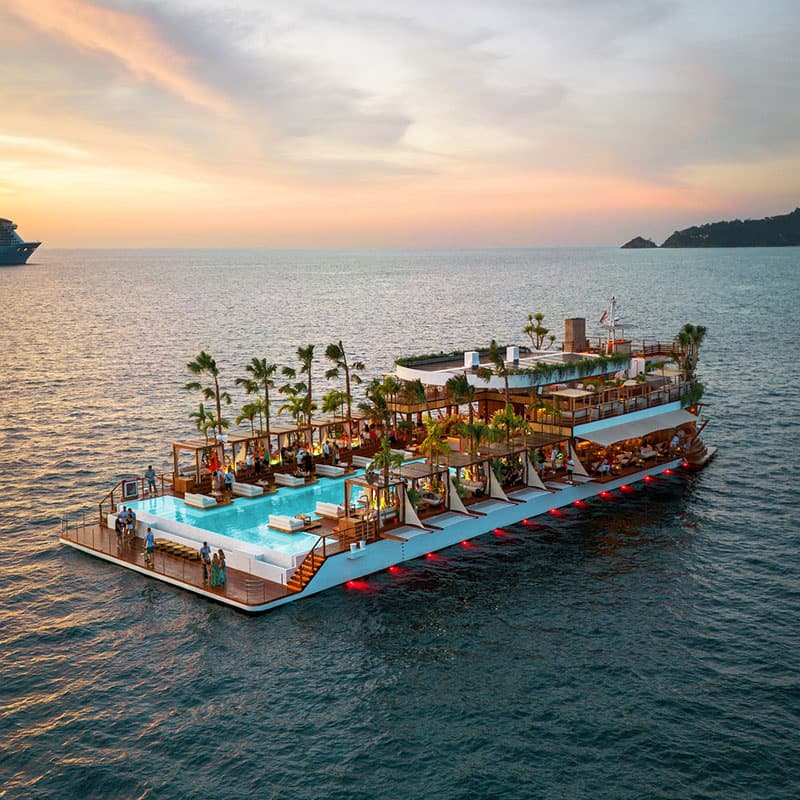Music festivals are increasingly stepping outside traditional formats. In Portugal, a country with a rich coastal culture, events held near water—on riverbanks, lakes, and even the ocean—are gaining popularity. These festivals don’t just create a unique mood; they become true open-air art installations. Here, music, the sound of waves, and the glow of evening lights merge into performances that cannot be replicated in conventional settings.
Music on the Water: New Formats and Bold Ideas
Water festivals are no longer just concerts with a water backdrop. Their stages can literally float: platforms on pontoons or barges become the main arena. Some organizers go even further—artists perform from boats, and the audience listens from kayaks, SUP boards, or even inflatable flamingos. One such example is the “Festa na Ria” festival in the Aveiro region, where the stage is set directly on the river and the surrounding area turns into a dancing lagoon. These events create a special atmosphere where participants feel a complete fusion with nature and sound.
Water as a Show Element and a Safety Feature
Portuguese organizers use water not only as a decorative background but also as a dynamic element of the show. Illuminated fountains, projections on water mist, laser beams reflecting off the waves—all this enhances the concert’s visual impact. Some festivals even set up audience sections right on the water: spectators sit in boats, catamarans, or water-based amphitheaters. This allows for comfortable distancing and safety—an important factor in the post-pandemic era.
A Blend of Cultures: Music, Traditions, and Gastronomy
Many water festivals in Portugal become not only musical but also multicultural events. For example, in the Alentejo region, some events mix electronic music with fado, and local dishes can be sampled right on floating platforms. At these festivals, the blend of tradition and innovation is particularly vivid: folk boats coexist with DJ decks, and the beats of basslines are suddenly joined by the sounds of a classic Portuguese guitar. This creates a unique atmosphere where each guest becomes part of a cultural experiment.
Online Entertainment and Hybrid Formats
Modern technology has had its impact: even water festivals now have a digital component. Many events are live-streamed—not only for those who couldn’t make it to the shore but also to attract new audiences. Some organizers create hybrid spaces where spectators can follow the show from online cabins, participate in interactive polls, or even “navigate” through the virtual festival territory. These online formats, by the way, are developing alongside other forms of digital entertainment, including online casinos, which also strive to recreate the feeling of real presence and vivid impressions.
Ecology and Care for Water
Water-based festivals inevitably raise the issue of environmental responsibility. Many of them emphasize ecological sustainability: biodegradable materials are used, waste is sorted, and guests are encouraged to use reusable containers. Some festivals even organize shoreline clean-up drives or hold lectures on ocean ecology. This transforms an entertainment event into conscious participation in preserving nature.
Emotions That Last
What water festivals give above all is a unique emotional experience. Sounds reflecting off the water, the sea breeze, the soft light of sunset, dancing barefoot on a pontoon—all of this stays in your memory. These festivals offer a new way to feel music, to go beyond the usual perception, and simply dissolve in the moment. And perhaps that’s why more and more people in Portugal choose music on the water instead of noisy halls and giant arenas.
These events are more than just an alternative to classic concerts. They are a real cultural trend, reflecting a desire for freedom, nature, and new forms of interaction between art and the audience. And as recent seasons show, water stages are not a temporary craze but a new language of urban culture.
Conclusion: The Sound of Waves and Beats as Part of Cultural Identity
Water festivals in Portugal have become more than just summer entertainment. They reflect a new approach to experiencing art, nature, and technology. These events not only transform the musical experience but also shape modern urban culture—where uniqueness, closeness to nature, and personal engagement matter more than scale and volume. They bring people together, inspire creativity, and leave behind not waste, but memories—vivid, energetic, and full of life. This is their true power: creating one-of-a-kind, unforgettable scenes where boats, waves, and music become part of a new generation’s cultural identity.
